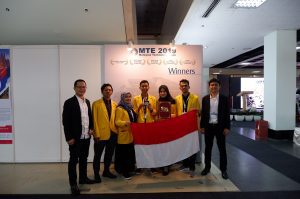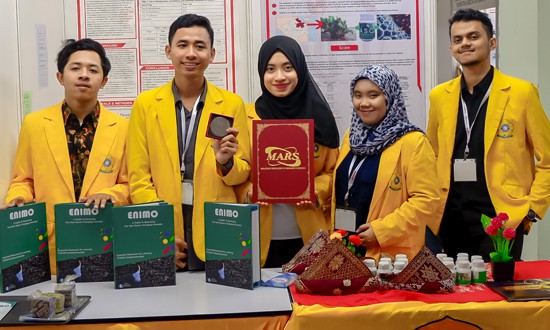Founded by five students of Sriwijaya University, Indonesia, ENIMO (Education is Number One) is an innovative venture initiated through in-depth research and analysis. It aims to advance STEAM (Science, Technology, Engineering, Art and Mathematics) based entrepreneurship education in Indonesia, especially in South Sumatra. The team consisting of Arika Sari, Diki Wahyudi, Gede Mudita Edi Putra, Mohammad Sulthan Alif Utama and Risda Intan Sistyawati exhibited their products in the Malaysia Technology Expo (MTE) and won Silver Medal.
Started in 2001, Malaysia Technology Expo (MTE) is a prestigious event in Asia. Every year, over 500 teams across the continent would come to exhibit their innovations in this event. ENIMO, a student startup from Sriwijaya University, Indonesia won the Silver Medal this year for their innovative approach to promote STEAM Entrepreneurship Education in Indonesia. “STEAM is an educational approach to learning that uses Science, Technology, Engineering, the Arts and Mathematics as access points for guiding student inquiry, dialogue, and critical thinking. We have developed products like learning books and android application for students, especially for those who are in their high school, to promote STEAM based entrepreneurship education in Indonesia,” says Arika Sari, Production and HR Manager, ENIMO.
ENIMO’s book contains six chapters of hands-on activities of solving real world problems, which involve the essence of the practices of science and engineering with tools like mathematics, technology, art and entrepreneur skills. “This book represents the practices of science and engineering by exploring multiple solutions to problems, addressing connections between STEAM disciplines, modeling real world innovation, embracing real world design, invention and innovation, connecting with authentic experiences, showing assimilation of new ideas, illustrating teamwork, diverse skills, creativity, cooperation, inviting divergent thinking and doing, integrating interdisciplinary and creative approaches, systems thinking, optimization, collaboration and communication,” claims Arika.
This unique book also captures the creative genius of the entrepreneur or innovator in pictures and verse to engage Indonesian high school students. It helps students transform classroom knowledge into marketable solutions and learn how to build viable business around them. The questions in the book will help students excel in the innovation economy, whether at major corporations or their own start-ups.

On the other side, using the android application developed by the team, students can learn about how a STEAM Entrepreneur made their business, the steps to develop a business using STEAM skills, solve a problem using design thinking process, analyze a STEAM case study, and draw a business model innovation canvas. Arika shares, “After learning from the app, students can save their favorite material and read based on their interest by the touch of their finger. ENIMO app also offers a guidance and essential resources for teachers to give the best method for students on teaching STEAM and how to integrate with entrepreneurship.” To make the teacher easy to evaluate the student’s conceptual understanding of entrepreneurship, ENIMO has also developed a feature called “ENIMO QUIZ.”
STEAM Based Entrepreneurship Education in Indonesia
“The 2018 Survey of Entrepreneurs and MSMEs in Indonesia shows a gap between younger (35 and below) at 40% compared to older founders (35 and above), at 60% of the sample. Despite half of Indonesia’s population being under 30 years of age, younger Indonesians face disproportionately high unemployment rates,” states Arika. Systemic conditions in Indonesia do not provide strong support for young people to enter the entrepreneurial space, with communities and families placing strong emphasis on entering stable careers such as civil service, medicine, law, and engineering. Further, Indonesia lacks enabling forces that support entrepreneurial activity and innovation from a young age, such as entrepreneurial courses in high school or innovation hubs. Majority of the emerging innovation hubs are in Jakarta.
Arika adds, “Indonesia’s high school completion rate has increased from 40% to 47% from 2010 to 2015 nationwide, however Indonesia ranks poorly for entrepreneurial training at all levels of schooling. While Indonesia has some areas to improve entrepreneurial education in schools, its educational support for entrepreneurs after high school is one of the enabling factors for entrepreneurship in the country.” Given that high school is the most common level of educational attainment, the potential exists for more entrepreneurial learning and adding more programming and training at this level.
Indonesia’s youth aged 18-to-24 are facing an unemployment rate of 15.6%, well above the overall country average of 6.2%. Overall, the education level, skills, and readiness of the workforce are the significant limiting factors for entrepreneurial activity in Indonesia, and an enabling policy environment tailored to entrepreneurial education would help Indonesia’s MSME sector. “Integrating STEAM with entrepreneurship is one of the keys to help Indonesian high school students understand about the concept of entrepreneurship,” opines Arika.

STEAM is based on the understanding that innovation is often found where different subjects intersect. It supports students to understand the world in a multidisciplined way, transforming the world in the form of comprehensive innovation, and cultivating their ability to solve problems. “STEAM education is mainly based on project-based learning, problem-based learning as the main teaching (learning) approach to guide students through cooperation and practice, to complete the theme of the project and solve problems encountered in life,” says Arika.
There is a strong body of evidence that suggests STEAM has a beneficial impact to learning across the board precisely, as it helps to develop the transferrable skills. STEAM’s foundations lie in inquiry, critical thinking, and process-based learning. The entire idea surrounding STEAM lessons and the STEAM approach is that it’s based around questioning. “We want to start asking non-Google-able questions. Inquiry, curiosity, being able to find solutions to a problem, and being creative in the finding of the solutions are at the heart of this approach. From that point of view, we have developed a learning method that blend both of entrepreneurship and STEAM. Our research has been validated in Sriwijaya University Education International Conference,” concludes Arika.




